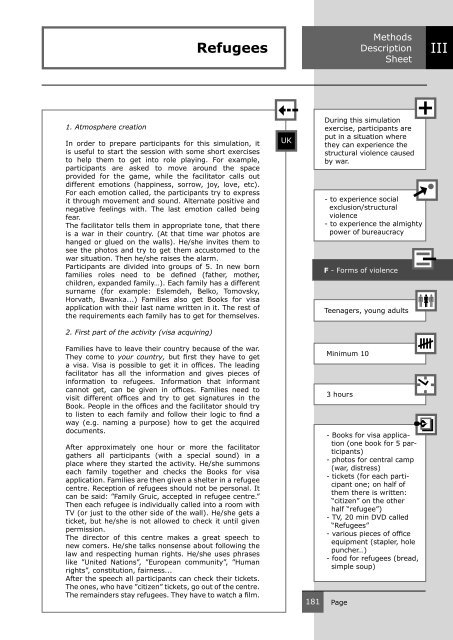Who are you? - Emergency Brake
Who are you? - Emergency Brake
Who are you? - Emergency Brake
Create successful ePaper yourself
Turn your PDF publications into a flip-book with our unique Google optimized e-Paper software.
1. Atmosphere creation<br />
Refugees<br />
In order to prep<strong>are</strong> participants for this simulation, it<br />
is useful to start the session with some short exercises<br />
to help them to get into role playing. For example,<br />
participants <strong>are</strong> asked to move around the space<br />
provided for the game, while the facilitator calls out<br />
different emotions (happiness, sorrow, joy, love, etc).<br />
For each emotion called, the participants try to express<br />
it through movement and sound. Alternate positive and<br />
negative feelings with. The last emotion called being<br />
fear.<br />
The facilitator tells them in appropriate tone, that there<br />
is a war in their country. (At that time war photos <strong>are</strong><br />
hanged or glued on the walls). He/she invites them to<br />
see the photos and try to get them accustomed to the<br />
war situation. Then he/she raises the alarm.<br />
Participants <strong>are</strong> divided into groups of 5. In new born<br />
families roles need to be defined (father, mother,<br />
children, expanded family…). Each family has a different<br />
surname (for example: Eslemdeh, Belko, Tomovsky,<br />
Horvath, Bwanka...) Families also get Books for visa<br />
application with their last name written in it. The rest of<br />
the requirements each family has to get for themselves.<br />
2. First part of the activity (visa acquiring)<br />
Families have to leave their country because of the war.<br />
They come to <strong>you</strong>r country, but first they have to get<br />
a visa. Visa is possible to get it in offices. The leading<br />
facilitator has all the information and gives pieces of<br />
information to refugees. Information that informant<br />
cannot get, can be given in offices. Families need to<br />
visit different offices and try to get signatures in the<br />
Book. People in the offices and the facilitator should try<br />
to listen to each family and follow their logic to find a<br />
way (e.g. naming a purpose) how to get the acquired<br />
documents.<br />
After approximately one hour or more the facilitator<br />
gathers all participants (with a special sound) in a<br />
place where they started the activity. He/she summons<br />
each family together and checks the Books for visa<br />
application. Families <strong>are</strong> then given a shelter in a refugee<br />
centre. Reception of refugees should not be personal. It<br />
can be said: ”Family Gruic, accepted in refugee centre.”<br />
Then each refugee is individually called into a room with<br />
TV (or just to the other side of the wall). He/she gets a<br />
ticket, but he/she is not allowed to check it until given<br />
permission.<br />
The director of this centre makes a great speech to<br />
new comers. He/she talks nonsense about following the<br />
law and respecting human rights. He/she uses phrases<br />
like ”United Nations”, ”European community”, ”Human<br />
rights”, constitution, fairness...<br />
After the speech all participants can check their tickets.<br />
The ones, who have ”citizen” tickets, go out of the centre.<br />
The remainders stay refugees. They have to watch a film.<br />
UK<br />
181<br />
Page<br />
Methods<br />
Description<br />
Sheet<br />
During this simulation<br />
exercise, participants <strong>are</strong><br />
put in a situation where<br />
they can experience the<br />
structural violence caused<br />
by war.<br />
- to experience social<br />
exclusion/structural<br />
violence<br />
- to experience the almighty<br />
power of bureaucracy<br />
F - Forms of violence<br />
Teenagers, <strong>you</strong>ng adults<br />
Minimum 10<br />
3 hours<br />
- Books for visa application<br />
(one book for 5 par-<br />
ticipants)<br />
- photos for central camp<br />
(war, distress)<br />
- tickets (for each parti-<br />
cipant one; on half of<br />
them there is written:<br />
“citizen” on the other<br />
half “refugee”)<br />
- TV, 20 min DVD called<br />
“Refugees”<br />
- various pieces of office<br />
equipment (stapler, hole<br />
puncher…)<br />
- food for refugees (bread,<br />
simple soup)<br />
III


